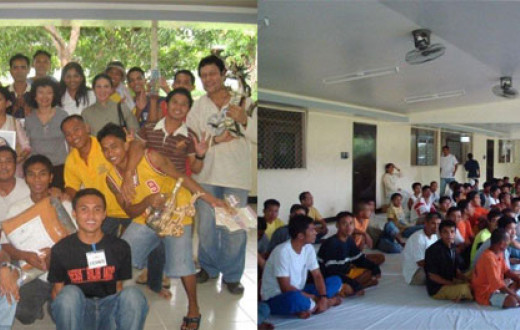In Hindu mythology, there is a story about Lord Vishnu and his battle with anger. Two demons, Madhu and Kaitabha, born from the dirt of Lord Vishnu’s ear, troubled the lord. Madhu means ‘anger’ and Kaitabha means ‘hatred’. Lord Vishnu fought for a thousand years, but he could not win over them.
How could he destroy anger and hatred that he had himself created? So, he called Devi - Divine Consciousness. When consciousness arises, anger and hatred dissolve. With the help of water, Devi destroyed Madhu and Kaitabha. Here, water represents ‘love’. So, with the help of love, consciousness destroyed anger and hatred. When consciousness fills with love, neither anger nor hatred remains - only eternal love remains.
Anger and hatred arise from listening. Neither the Creator (Brahma) nor the Destroyer (Shiva) listens. Both just do their job and leave. But those who manage the world and its affairs (Vishnu) have to listen to everyone. That is when anger appears.
Why people are fighting: The root cause
People fight because they feel they are right. This feeling of righteousness gives them the strength to fight. If someone feels they are wrong, they do not have the strength to fight.
This limited and narrow sense of righteousness has created the worst in the world. All the wars of the world have taken place because of it.
If we broaden our vision, and look at the truth impartially, we will see a different picture. Our sense of righteousness is a mental concept; beyond that, is the real cause of any effect. Wisdom is looking into that real and ultimate cause.
In today’s world, there are so many things that make us angry. And then anger is followed by guilt, violence, hurt, and hatred. It becomes difficult to break the cycle.
Here are some tips for you to break this cycle, and become free and happy again.
#1 Treat angry people like firecrackers
Look at an angry person like a firecracker. In Diwali, we light crackers, and then run away, enjoying it from a distance. After some time, it will fizzle out. An angry person is like that.
But, we do not burn crackers inside the house, or keep anything precious near it. So, just see that there are no precious things around angry people.

Without angry people, there is no fun in this world. So save yourself, and watch them from a distance. Do not get involved, and you will have fun!
#2 Win over anger with consciousness
When you get angry, and do not express it, you suffocate. On the other hand, when you express it, you feel guilty. So, the key is to rise above both. See life from a different perspective.

Look at your emotions as a decoration - like icing on a cake of different colors and designs. This decoration doesn’t really matter to the substance. Similarly, these emotions should not bind you, or make you feel guilty. This will happen when you grow in your consciousness.
During Navratri, we do satsang, and follow a diet, so that the mind dives into waves of devotion. In this way, we avoid all opportunities of anger and other vices.
#3 Use strength to cope with aggression
Why does aggression arise in you? When you think that somebody is bigger than you, you become aggressive, right? Think about it. When somebody is really bigger than you, or they are too small to count, you don’t become aggressive. But, when you think that somebody is on par with you, or only a little bit bigger or smaller than you, you become aggressive. This is because of your ignorance about your own strength. Wake up and see what you are, and with whom you are becoming aggressive.

You do not become aggressive when you want to kill a mosquito! You know that it is just a mosquito, and that it doesn’t amount to much. Similarly, become aware of your strength.
#4 A little imperfection is healthy for the mind
Too much expectation of perfection brings anger and violence in the mind. It becomes difficult to accept imperfection. Sometimes, things don’t go according to plan. One should be ready to handle that.
Give a little space for imperfection; it is necessary. It will bring you more patience. With increased levels of patience, there is less anger, and, with less anger, there will be no violence.
#5 Give a shield of knowledge to love
If someone you love does not behave according to your expectations, you get hurt. After all, you are not hurt by some random person walking on the road! But, if a person you love, or you feel close to, does not greet you or smile at you, you feel hurt.
When people feel hurt, they close themselves up, become hard-hearted, and act cruelly.
Love is a fine and delicate emotion; it is easily hurt, and can quickly turn into hatred, anger, blame, grudges, bitterness or jealousy.
How can you save this delicate emotion from getting distorted in our society? Knowledge. It is the right shield to safeguard this love. Knowledge maintains the purity of love, and keeps it away from all sorts of vikaras. The love of saints is always pure because it has the shield of knowledge to protect it.
Also, when you go deep into sadhana, you can experience love at very subtle levels.
When anger is good
Is it possible to never get angry?
What has your experience been? As a child, when a toffee was taken away from you, you got angry. When you were in school, college, and office, you got angry with different people for different reasons. So, we all get angry. The point is how soon you come out of your anger. There are three factors that decide this.
1) The first factor is the frequency of your anger. This is inversely proportional to your strength. The weaker you are, the more you are prone to anger. The stronger you are, the less prone you are to anger. So, determine where your strength is. Why are you losing it?
2) The second factor is your vision. How in-depth is your understanding of the people around you?
3) The third is the degree of your attachment. Behind anger, if there is a desire for comfort, pleasure or ego, your reaction will be different from when your anger has a purpose. If your anger is to set things right, it is useful.
So, anger is not always bad. It can be good, when it is sparingly used. If you use it every day, it has no value. Rather, it puts down your value. So, don’t allow anger to use you. Instead, you use it as an instrument of positive change.
The Sahaj Samadhi Meditation (SSM), can help channelize your energy leading you to a positive, reflective, and energetic space.





















